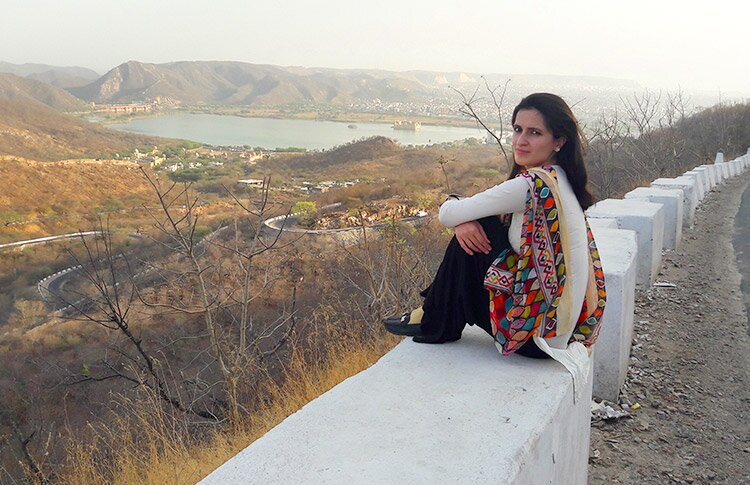EXCLUSIVE: Meet Aliya Harir, The Pakistani On An Indo-Pak Peace Mission
- JWB Post
- March 25, 2016

At the tender age of 19, most of us are busy dancing, partying, and clubbing our way out of teenage. How many of us, at that time, really bother ourselves about gigantic concerns such as world peace, cross-border relations, et al?
Rarely any, right?
But, here’s one girl who is an exceptional exception to this. She was 19 when she became interested in one of the world’s most crucial cross-border relations – the Indo-Pak relations… and ever since, she has gone out of her way (out of the border, in fact) to bring about what she firmly believes in – peace and bonding.
Say hi to Aliya Harir– the now 24-year-old Pakistani girl who is on this mission of bringing her country (Pakistan) and her country’s supposed rival (India) closer through her cross-border initiative Aaghaz-e-Dosti.
She was recently in Jaipur, and though we missed meeting her during her stay here (sigh!), we couldn’t miss bringing her story to you all. Read the excerpts from our email-interview with her.
At JNU, Delhi
JWB: We know very little about you. Tell us something more?
Aliya: I was born in Karachi, but grew up in an underprivileged background in Chitral, in the province of KP, Pakistan – a place that shares the longest border with Afghanistan where traditionally women are kept out of sight and out of power.
I have done Masters in International Relations from Quaid-i-Azam University Islamabad, and currently, I am the convener of a cross-border initiative called Aaghaz-e-Dosti (literal meaning is beginning of friendship) that aims to bring the people of India and Pakistan closer. I have headed two peace delegations to India under different cultural exchange ventures.
JWB: What inspired you to take up and work on such a sensitive issue?
Aliya: I grew up hating India. Thanks to the media, politicians, and textbooks! I used to keep asking my father where he would take us in case India attacks Pakistan.
In 2011, Pakistan lost the Cricket Cup to India. This is also the same year when I was selected to participate in an exchange program in the US. The first Indian I met there asked me “Do you watch cricket?” which turned into an unpleasant exchange of comments.
But the more Indians I met, the more I was stunned at how instantly I connected with all of them. While on the exchange program, it happened so that I fell and hurt myself. Hundreds of people came to visit me in the hospital. It no more surprised me that most of those coming to help were from two countries: my beloved country Pakistan, and the rival country India!
All this, and the fact that how similar Pakistanis and Indians looked in their appearances, language, and style of living – beyond the man-made boundaries; inspired me to bring the people of both these countries close.
JWB: What happened next?
Aliya: I was an accounting major by then, but it wasn’t long before I realized that my capacity for bringing social change was greater. Back home, I not only enrolled for a degree in International Relations but also initiated Indo-Pak peace activities on a minor level in public places and universities. I found similar fellows on facebook and later we all co-named our activities for friendship as Aaghaz-e-Dosti.
JWB: Tell us more about Aaghaz-e-Dosti. What is it exactly that the initiative does?
Aliya: Started in 2012, Aaghaz-e-Dosti aims to create peace and friendship between the people of India and Pakistan. It has involved itself in peace building and conflict resolution by facilitating people-to-people contact, challenging mutual hatred and suspicion, creating a culture of peace and understanding among people of both countries and highlighting the issues of victims of conflicts.
Aaghaz-e-Dosti has been conducting interactive sessions in schools and colleges called Aman Chaupals; Peace Workshops and Seminars; Greeting Cards Exchange; annual Indo-Pak Peace calendar which is a collection of paintings made by school students from both sides of the border; a virtual peace-building course called Friends Beyond Borders wherein Indians and Pakistanis engage in dialogue over different issues for eight weeks; virtual campaigns that are run on our social media pages; articles by our members on issues ranging from discussing the need for peace to core issues of conflict; letters, appeals and meetings with authorities on both sides to improve Indo-Pak relations.
Psst! Here’s an interesting piece of trivia! Aaghaz-e-Dosti is a women-led initiative. Women make up the majority of the team on both sides of the border.
JWB: What is your ultimate goal in life?
Aliya: Our ultimate goal is the end of the Indo-Pak conflict and establishment of unwavering bonds of peace and friendship between India and Pakistan.
At Rock Garden, Chandigarh
JWB: What does peace mean to you?
Aliya: Peace is crossing our boundaries of fear. For the first time, when I was going to India, my father was extremely tensed. My friends said “pagal ho?” “aur koi country nahi hai jane k liay?” “zinda wapas aaogi?”. In short, everyone said it’s too dangerous; don’t take the risk of going. This still happens all over again. My friends and family have witnessed me packing my bags and heading to India four times, and every single time there was this repetition. But I discovered, every single time I crossed a boundary of fear, I found love on the other side. This is my definition of peace: going beyond boundaries of fear.
JWB: What perceptions do the children in Pakistan have about India?
Aliya: It is the media, the biased textbooks, and the politicians that have tailored an unfriendly image about India. But Aaghaz-e-Dosti is educating children about the ground realities and in understating of the fact that the people on the other side of the border are like us not only in sharing of history, culture, and language but also in habit and routine.
JWB: How was your trip to India?
Aliya: As they say, incredible! My trip to India has been incredible. It was my fourth time in India. India and Pakistan issue city-specific visas to each other and also that the citizens cannot apply for a visa for more than five cities.
JWB: What would you call as the most memorable incident of this trip?
Aliya: Meeting Arjun Kapoor. I am his biggest fan and have his photo in my wallet and in my room. My family, friends, as well as colleagues at work, know how much in love I am with Arjun Kapoor. The last time I came to India in September 2015, I went to Ajmer Dargah and prayed that I get to meet Arjun Kapoor at least once in my life.
During this trip of March’16, in Chandigarh, a journalist told me that Arjun Kapoor was in town for an event. I requested this journalist to get me a chance to say hi to him, and I am extremely glad that I got this chance. I had written Arjun Kapoor a letter, and had so many things that I’d thought I would tell him, but when I actually met him, I was speechless! And I was very hesitant in believing that I was living my biggest dream.
JWB: One thing that you like the most about India?
Aliya: The hospitality. It is extremely surprising to tell some random person that you are from Pakistan and being received with love. Indians are extremely hospitable and have so much love to give.
JWB: One thing that you would want to change about India?
Aliya: It’s very difficult to generalize. Something that exists in one part of India might not exist in the other. But in general, I would like to change the common perception that an average Indian has of Pakistan. Also, I wish to have cleaner public spaces in India, which are also a big problem in Pakistan.
JWB: Something that you learned here in India?
Aliya: Women are very independent and liberated here. They are challenging the social norms and traditions that disempower them. It is very inspiring to see Indian women overthrow the gifts of patriarchy. There is a very high level of feminist consciousness. I take back this learning that it is very important to raise a feminist consciousness in Pakistani women as well.
JWB: One food delicacy of India that you would like to exchange with Pakistan?
Aliya: It is difficult to name only one food item because Indian food is diverse and very delicious and irresistible. Also, there is the fact that the North India and Pakistani Punjab and Sindh share the same food. I would love to exchange South Indian food Dosa, Idli and Sambar, with Pakistan.
JWB: And one food delicacy of Pakistan that you would like to exchange with India?
Aliya: Our food street that is similar in India: from Dahi Puri to Golgappas.
JWB: If you had one wish to ask for, would you want the coming together of India and Pakistan?
Aliya: My wish would be for the conflict to end once and for all. Partition needs to be forgotten now and we need to move beyond and learn to respect each other as separate nations.
I don’t know about you, but Aliya’s work and brave efforts inspire me. I guess it is about time that we Indians, too, broaden our perspectives and drift away from our prejudices against our neighbouring country that once was a part of us, or of whom once we were a part.
- 0
- 0







